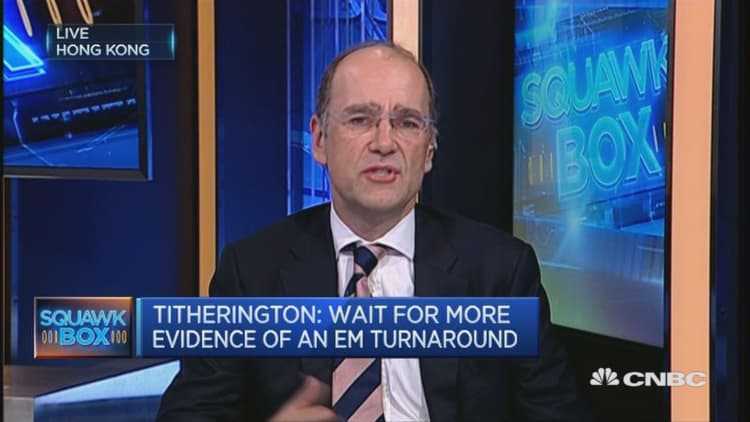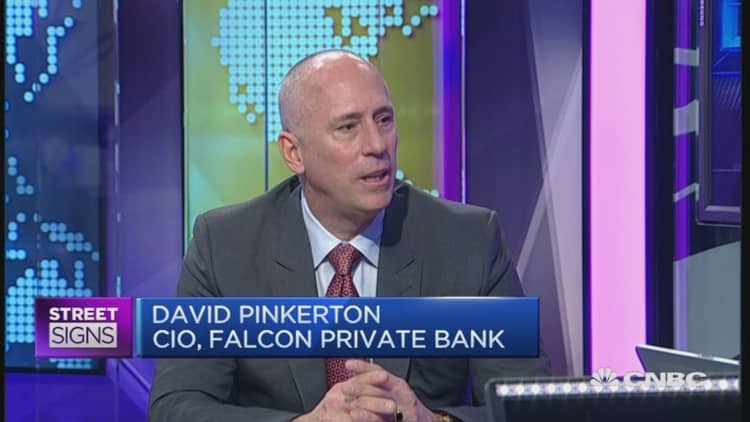Emerging economies struggling with low commodity prices and a strong U.S. dollar could soon expect some reprieve thanks to central banks and steadying oil prices, analysts say.
This week has seen the U.S. dollar weakening after the Fed reinforced expectations for two interest rates increase this year and the Bank of Japan left rates unchanged. The oil prices are also seen to be steady after setting a 2016 high on Thursday as traders locked in profits.
Nandini Ramakrishnan, global macro strategist at JP Morgan Asset Management told CNBC Thursday that this could mean the emerging markets are going to see better times?
"If those lack of headwinds remain, then you have an emerging market complex that, if you are selective about it and you pick the companies that have an earnings growth forecast, which they haven't had across the board for much of them, then you do have a good play, valuations wise for emerging markets," Ramakrishnan told CNBC.
The strong U.S. dollar has remained a massive risk for emerging market currencies. The trend started in late 2014 when the Fed finally decided to end its bond-buying program, leading to the formation of 'Fragile Five' – Indonesia, Brazil, Russia, Turkey and India – countries with weak currencies. Domestic factors such as policy paralysis also played a role but the dependence on the Fed policy continues to dominate.

However, emerging markets have come a long way since then with better growth, domestic reforms and stable currency. But volatility in the U.S. dollar is still a worry.
"We are expecting more stability out of the dollar, see what happens with ECB and BOJ," Daniel Morris, senior investment strategist at BNP Paribas told CNBC.
Furthermore, worries about the economic slowdown in China have also sent shockwaves through the global financial markets. Due to the massive size of the economy and its immense contribution to the global gross domestic product (GDP), investors worry if the slowdown can impact global growth. But BNP Paribas' Morris says China's problems are manageable.
"Certainly what you have seen in terms of credit growth makes you nervous that you are going to face challenges at some point. At the same time, you have to remember that one, the debt is denominated in local currency so it's not an exchange rate crisis as you have seen in other countries. Secondly, the debts are all against the banks and the banks are owned by the government so it is the government's problem. So even if they have problems at some point, it is going to be manageable," Morris said.
China had a disappointing start to the year after weak manufacturing data led to the Chinese stock markets plunging by 7 percent. However, those bullish on the economy have said the country will slowly stabilize and is currently transitioning its economy from manufacturing to service.

Some analysts have said that the tide is turning for emerging markets with fundamentals improving and growth expected to pick up next year. "Inflows are returning to emerging market debt as valuations are attractive from a historical perspective and relative to developed market bond yields," Marci Ruijer, Lead Portfolio Manager of NN IP's Emerging Market Debt Hard Currency Strategies at NN IP Investment Partners said in a research note. However, uncertainty in the global market space still remains a massive concern.
"Emerging markets have experienced a rollercoaster ride in the past few quarters and volatility is likely to stay for a while. Looking at emerging market debt hard currency, the key things to watch in the coming weeks and months are the oil price and the intentions of the OPEC, the current developments in the Chinese market and the intended rate trajectory of the U.S. Federal Reserve."


